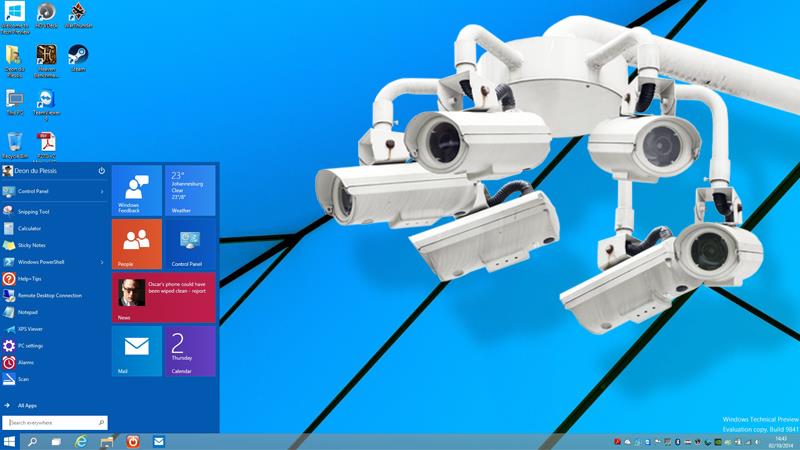Well, here’s a turnup for the books. In the age of huge concerns over individual online privacy, Microsoft has stuffed the Windows 10 Technical Preview (TP) with all kinds of data-gathering tools that scoop up information – including the personally-identifiable kind – which is then sent back to Redmond for analysis. It’s all right there in the TP’s privacy statement.
Yes, that’s right, if you’ve downloaded and are using the Technical Preview, Microsoft knows everything about you, including who and where you are and what you have done with the operating system so far. There’s even a keylogger in there that records your keystrokes; Microsoft says it’s to improve “autocomplete and spell check features”.
Here’s a fun excerpt that should get any privacy advocate’s hackles up:
“When you acquire, install and use the Program, Microsoft collects information about you, your devices, applications and networks, and your use of those devices, applications and networks. Examples of data we collect include your name, email address, preferences and interests; browsing, search and file history; phone call and SMS data; device configuration and sensor data; and application usage.”
Yikes.
So basically, if you don’t want to share your data with Microsoft, don’t download and install the Technical Preview.
It’s all about the analytics
This is being done in the name of analytics, of course; Microsoft needs to know how the TP is being used so that they can make the necessary changes that will theoretically make the final release version of Windows 10 a much better operating system, and clearly they’re relying on more than just the built-in Feedback Form to do that.
The saving grace here is that evaluating the Technical Preview is entirely voluntary, and to Microsoft’s credit the data-gathering features of the OS are laid out quite clearly and right at the top of the privacy policy so it’s not like anyone was hiding it, exactly. But no-one make a lot of noise about it, either.
Computerworld’s Juan Carlos Perez, in addition to having a badass name, raised the question of whether these data-gathering features will be removed once the operating system is final. Interestingly, Microsoft’s answer to his emailed query was, as he calls it, “non-committal”.
The unnamed spokeswoman he talked to said “When we release the new version of Windows, we will have a privacy statement that reflects the final product, and will share more as development continues.” I’d call that “obtuse”, myself, but that’s also to be expected from an official spokesperson talking about a work-in-progress.
Microsoft’s transparency on the matter may be a temporary balm if similar wording makes it into Windows 10’s final privacy policy, which analyst David Johnson from Forrester Research believes is a possibility. At least it’s out in the open and up for debate, which is essentially what Microsoft has asked for by releasing the preview so early.
[Source – Windows.Microsoft.com, Computerworld]

